IRI-Colombia fulfilled another dream: the launch of the first local chapter in Bogotá. Religious leaders of various faiths, academics, scientists, civil authorities, representatives of indigenous communities and allied institutions in the care of creation participated in the installation ceremony.
June 13, 2025 will be engraved in the history of IRI-Colombia as a date of great importance, because in addition to installing a new local chapter in the country’s capital – the first outside the Amazon – around seventy religious leaders and representatives of communities and confessional organizations reaffirmed their commitment to the Amazonian tropical forests from the faith, spirituality and environmental awareness, and joined the Interfaith Initiative for Tropical Forests.
The installation of IRI-Bogotá was attended by religious leaders from various denominations, such as the Roman Catholic, Baptist, Presbyterian, Greek Orthodox, Anglican Episcopal, Christian Crusade, Syrian Orthodox of Antioch, Assemblies of God, Seventh-day Adventist, ACT Swedish Church, Bethesda Missionary Center and the Soto Zen Community. Representatives of organizations such as the Interreligious Council of Colombia, the World Council of Churches, the Inter-Church Commission for Justice and Peace, and the Inter-Church Dialogue for Peace (Dipaz) also attended.
“From today, Bogotá joins the network of spiritual voices in defense of creation. The capital has the opportunity and the duty to become a strategic center of advocacy, awareness, mobilization and connection with the forest. What is at stake is not a distant landscape, it is our water, our air, our food, our peace,” said Blanca Lucía Echeverry, national coordinator of IRI-Colombia, who in addition to presenting the action strategies and the main advances of the Initiative, officially installed the new chapter, beginning the life of IRI-Bogotá.
“The role of religions in promoting ecological awareness is undeniable. The Amazon crisis invites us to reflect on our powers, to act on faith in defense of the commons,” said Elias Szczytnicki, who gave the lecture “Faith and Ethical Responsibility in the Face of the Amazon Crisis, an Interreligious Call for Water and Life.”
In his presentation, the Regional Director for Latin America and the Caribbean of Religions for Peace referred to the impact of documents such as Laudato Si, of the Catholic Church, and Al-Mizam, an Islamic document endorsed by more than 300 Muslim theologians, on the way of understanding the care of the planet from faith and highlighted a new trend that openly brings spiritual leadership closer to the protection of nature. moved precisely by their religious convictions. “In public we defend the environment, the tropical forests because we believe in a creator God,” he said.
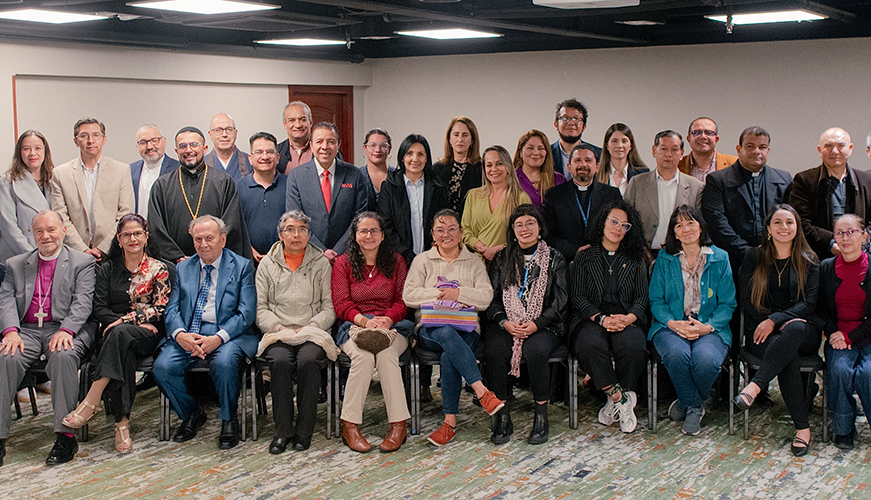
Water, between faith and science
The installation event of IRI-Bogotá had a strong pedagogical component, which included two panels and a keynote speech.
With the purpose of bringing together the spiritual and scientific dimensions, and identifying meeting points between the two, which allows us to advance in the protection of the Amazon biome, the panel “Faith and science in dialogue for the defense and restoration of the Amazon”, moderated by Carlos Augusto Lozano, senior advisor of IRI-Colombia, addressed two perspectives of water: as a spiritual value and a resource that must be used rationally and have governance.
“For Amazonian communities, the Amazon River is a living being that is born from the fall of a tree that the Huitotos call Monilla Ayama, the tree of abundance, of food, of life,” explained the Rev. Loida Sardiñas, a priest of the Anglican Episcopal Church.
who referred to the water cycle from sacredness and made a tour of different religions and spiritualities to analyze the sacred meaning of water in them. According to the professor at the Javeriana University, PhD in Theology, water is a symbol of life, health and well-being present in most of the creation myths, called cosmogonic myths.
“IRI-Colombia has done a job of raising awareness and effectively protecting tropical forests, rivers and guardian communities. This implies putting the ethical, religious, and spiritual influence of communities and religious leaders at the service of this sensitization and awareness of the protection and care of the Amazon. This role of religions in promoting ecological awareness is undeniable,” added the nun.
For his part, the specialist in Environmental Law, Mauricio Madrigal, pointed out that each person, group or organization relates to water in different ways. “When that relationship is one of care or protection, it is welcome,” said the lawyer, master’s degree and Ph.D in Human Rights, who referred to social and economic factors such as structural racism or contamination by mercury, lead or cadmium, which affect water governance, understood as an integration of knowledge and know-how in decision-making about the vital liquid.
“The ultimate goal of water governance should be to guarantee the human right to water, the rights of rivers and ultimately water justice,” added the professor at the Universidad de los Andes and Specialist in Political Advocacy, at WWF Colombia.
The jungle and the city
The second segment of the academic agenda was in charge of the biologist from the National University and expert in aquatic ecosystems, Carlos Alberto Rivera, who gave the keynote lecture “Relations between the Amazon and the water cycle of Bogotá”, a key space to understand the connection between the Amazon rainforest and cities.
The professor of the Javeriana University and member of the Javeriano Water Institute referred to the physical dynamics that connect the water cycles of the Colombian Amazon and the Andean area.
The scientist, who holds a PhD in Fundamental and Applied Ecology, addressed topics such as the variety of the equatorial climate, the impact of deforestation on water, flying rivers and the connection between the climate of the Amazon and rainfall in the central region of Colombia, understood as an area that encompasses the departments of Cundinamarca, the Capital District and a large part of Tolima.
“The care of the watersheds is key in Bogotá, because its water depends on the Amazon, but it is not clear if the contribution of water from that region will be continuous, especially due to deforestation rates, which have a high impact on flying rivers,” the scientist warned.
A Hand to Environmental Justice
“There is an interrelationship between life, which we understand from our cultural, ethical, spiritual or religious frameworks,” said the Political Advisor of Rainforest Foundation Norway, David Ricardo Flórez, who moderated the second panel, called “The Amazon and Bogotá: the challenges of an ignored relationship”, a space for reflection on the role that IRI-Bogotá can play in the protection of the Amazon. as a nucleus of work that will develop its actions from the central region of the country and how to help the faith communities of the Andean region to better understand the Amazon and its contributions.
“I love to see how so many people are gathered today, united by empathy, sensitivity and respect for the common home,” said environmental engineer María Daniela Pulido, specialist in geographic information systems, professor and director of research at the Navarra University Foundation.
Based on the analysis of the water component, during her speech, the professor and director of research at the Navarra University Foundation, explained the interrelationship between the Amazon and Andean regions. “Here we have three mountain ranges. The Eastern Highway is very important because it is the one that connects directly with the Amazon. Bogotá and Cundinamarca are located at a strategic point that divides the hydrographic basins: the tributary waters of the Magdalena River and those that drain to the eastern plains that, in turn, drain water to the Amazon,” explained the professor and researcher of the Navarra University Foundation.
“A good starting point is to reflect on the value we place on things. And that value depends to a large extent on being able to identify the benefits it generates, for example nature,” said agronomist Liven Fernando Martínez, Ph.D. in Tourism, Economics and Management.
The professor and researcher at the National University of Colombia addressed other ecosystem services such as the process of soil formation, fundamental for life on the planet, and the urgency of recognizing, on the one hand, the sacred value of life, and on the other, that the human being is not the only form of life with the right to exist. “We coexist with other beings, we share this space in the biosphere, on our planet. Just as we have rights, nature should also have them,” said the academic, who has a master’s degree in Environment and Development.
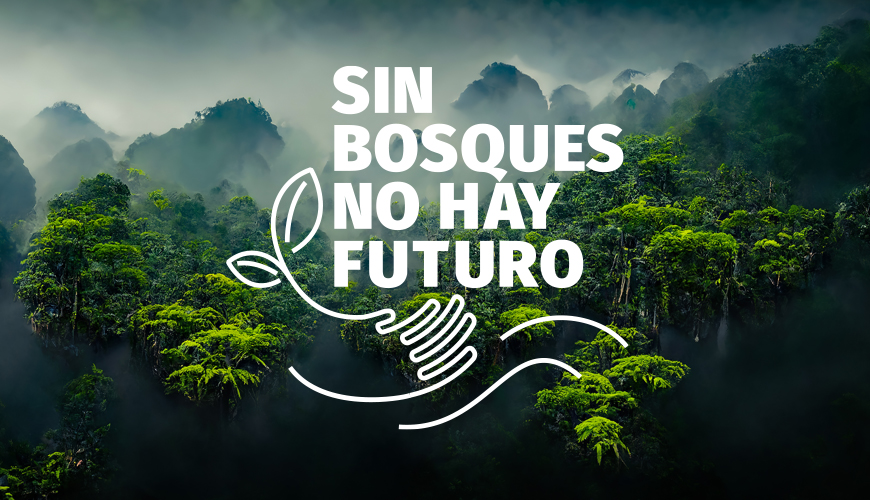
Without forests there is no future
“Hurricanes, floods and forest fires are the order of the day on the world scene, more and more frequently, with increasing intensity, as scientists have predicted for decades,” emphasized Diana Cristina Carvajal, communications officer of IRI-Colombia, who presented “Without forests there is no future”.
This ambitious communications campaign seeks to expand Colombians’ awareness of the importance of Amazonian tropical forests, their essential role in the water cycle and in the prevention of emergencies caused by extreme weather events such as droughts and severe rainfall.
“Water is an essential element for existence and it is life that is at risk if we do not act to protect it. Without water there is no life. Without forests there is no water. Without forests there is no future,” warned the communicator. With his presentation, the installation of IRI-Bogotá concluded. The creation of this new local chapter is part of IRI-Colombia’s territorial intervention strategy and seeks to strengthen the presence of the Initiative in strategic urban contexts, improve the articulation between the city and the Amazon, and consolidate a national network of interreligious advocacy in defense of the Amazon rainforest and climate justice.
Read the full edition of El bosque es vida magazine here (in Spanish).
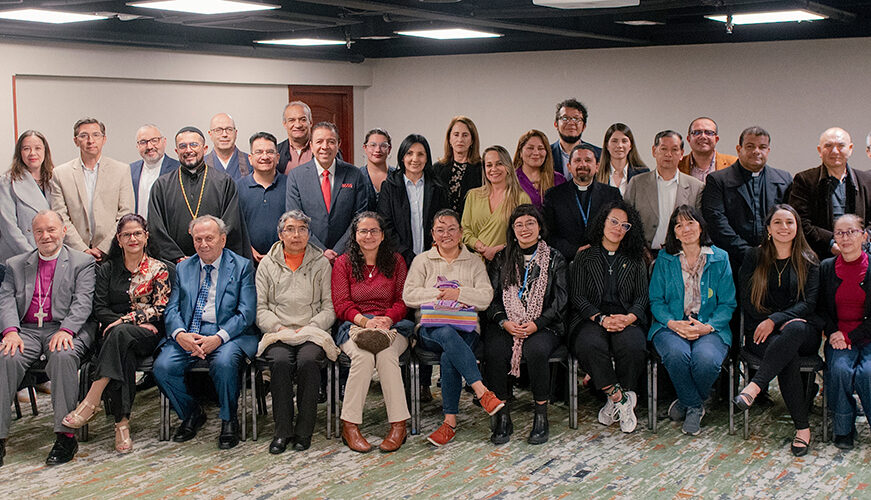
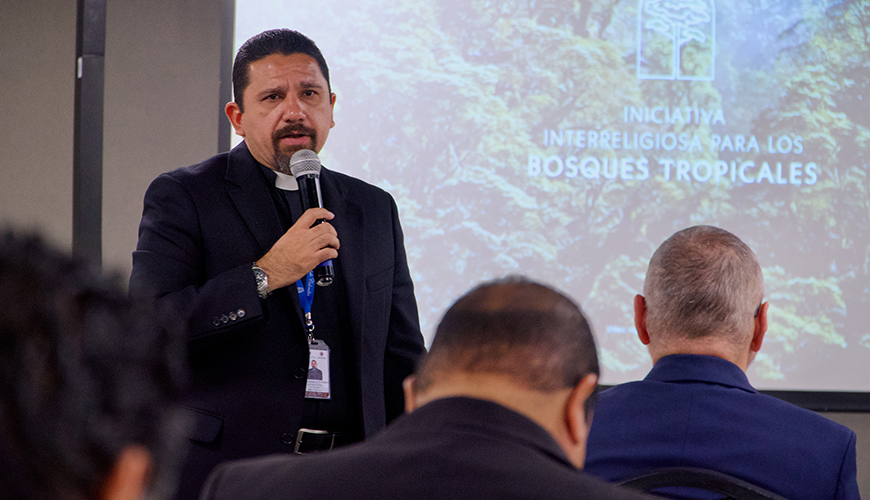 Father Mauricio Rey, director of Pastoral Social Caritas Colombia.
Father Mauricio Rey, director of Pastoral Social Caritas Colombia.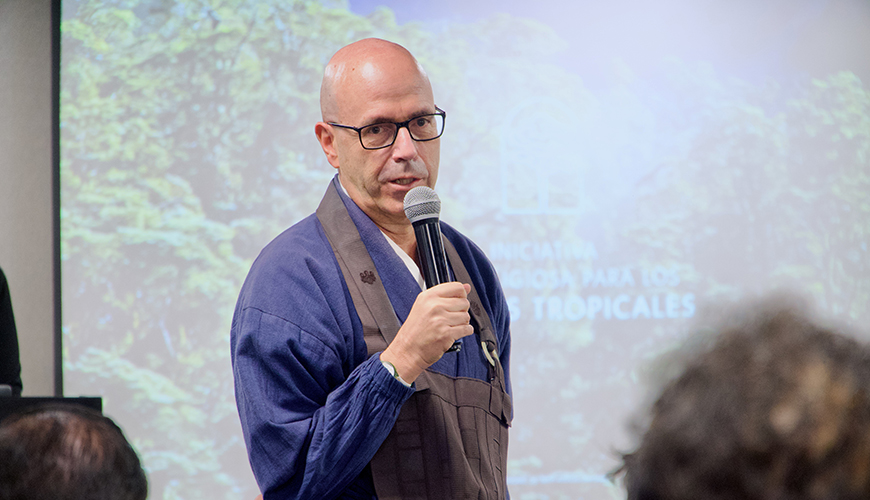 Monk Dairén Jácome, Soto Zen community.
Monk Dairén Jácome, Soto Zen community. Blanca Lucía Echeverry, national coordinator of IRI-Colombia.
Blanca Lucía Echeverry, national coordinator of IRI-Colombia.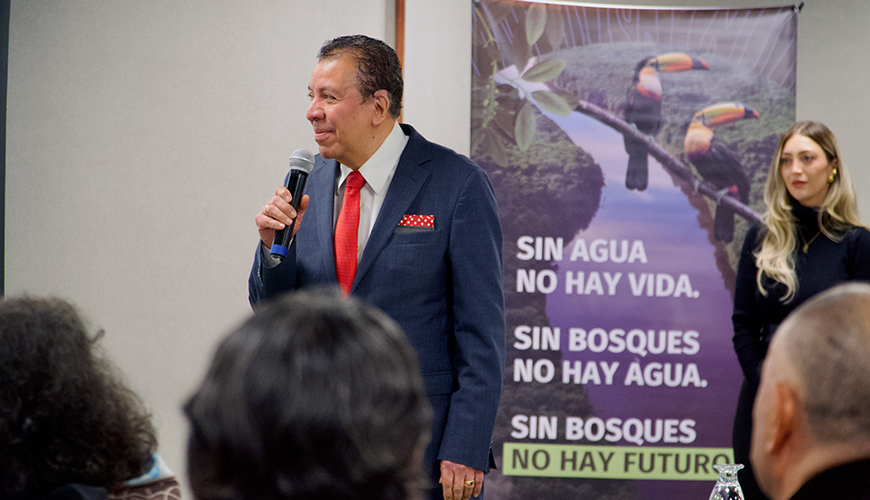 Pastor Edgar Castaño, Baptist Church.
Pastor Edgar Castaño, Baptist Church.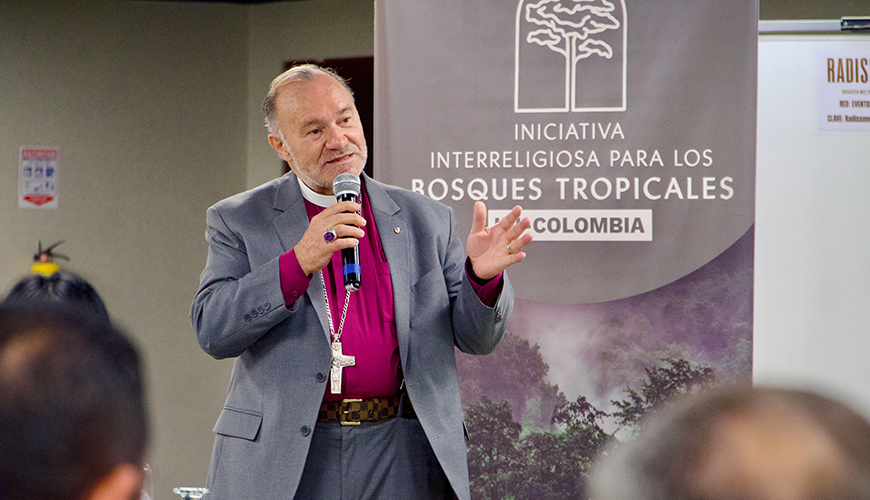 Bishop Francisco Duque, Anglican Episcopal Church.
Bishop Francisco Duque, Anglican Episcopal Church.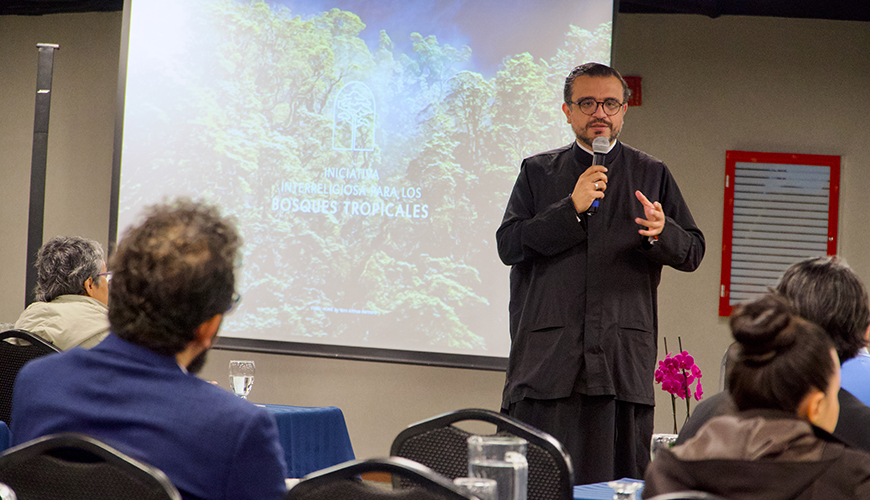 Father Alejandro Montes, Greek Orthodox Church.
Father Alejandro Montes, Greek Orthodox Church.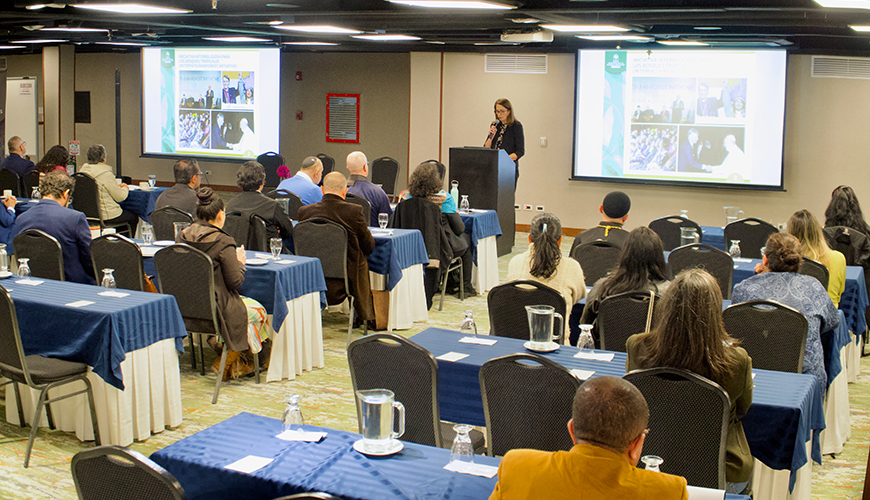
 Elias Szczytnicki, Religions For Peace
Elias Szczytnicki, Religions For Peace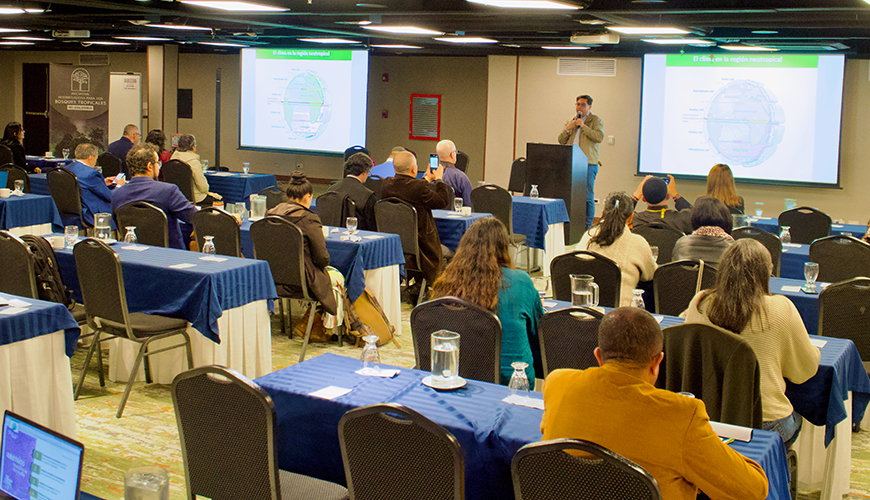
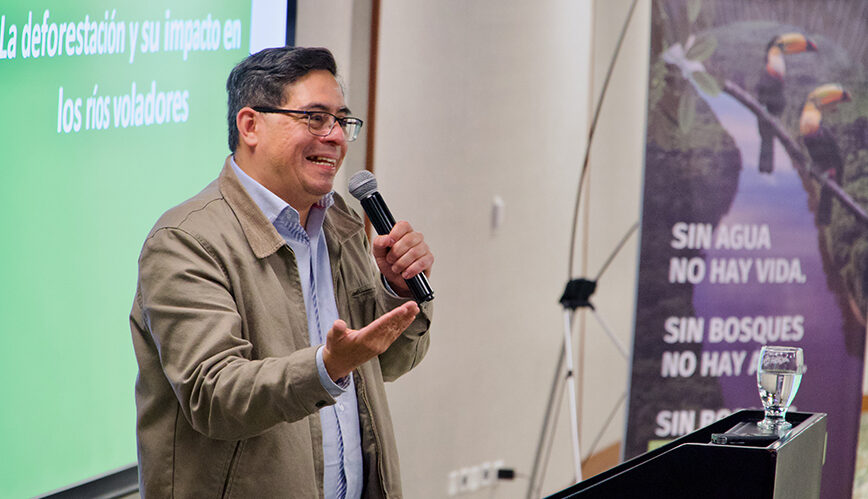
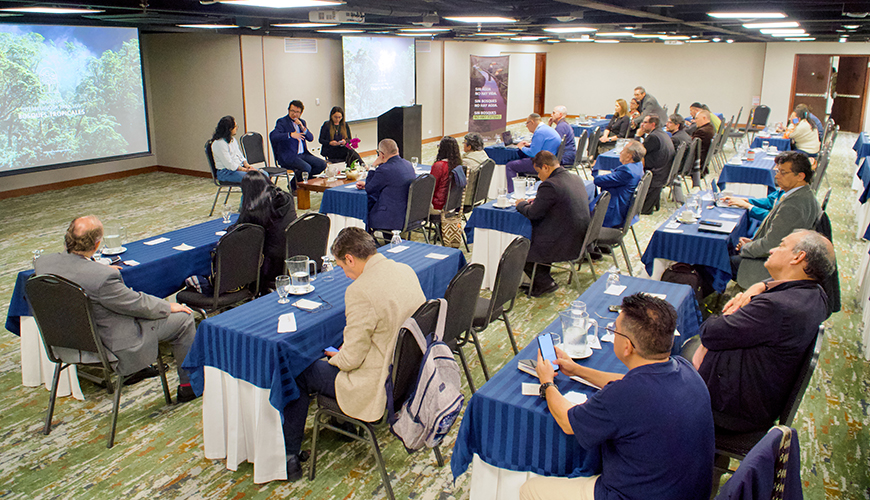
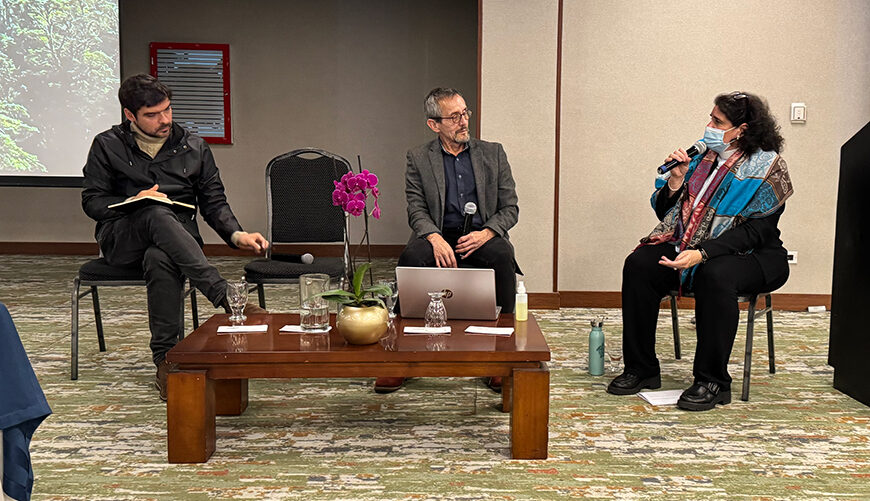 Mauricio Madrigal, Carlos Augusto Lozano and Reverend Loida Sardiñas.
Mauricio Madrigal, Carlos Augusto Lozano and Reverend Loida Sardiñas.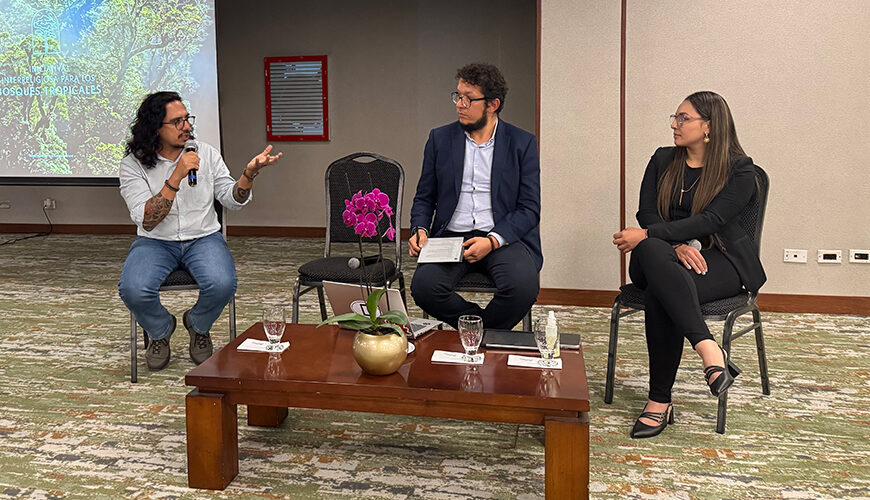 Liven Fernado Martínez, David Ricardo Flórez and María Daniela Pulido.
Liven Fernado Martínez, David Ricardo Flórez and María Daniela Pulido.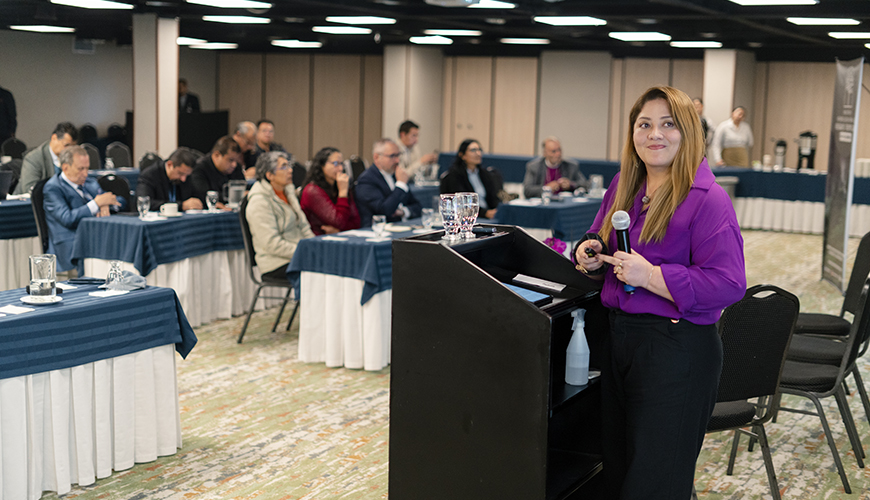 IRI-Colombia communications officer Diana Cristina Carvajal presented the campaign “Without forests, there is no future.”
IRI-Colombia communications officer Diana Cristina Carvajal presented the campaign “Without forests, there is no future.”

